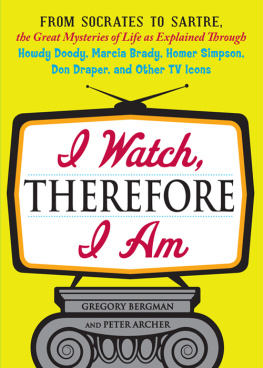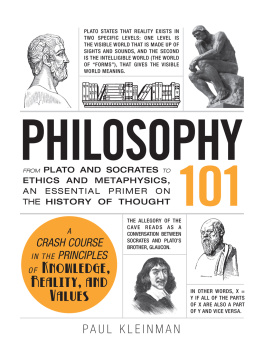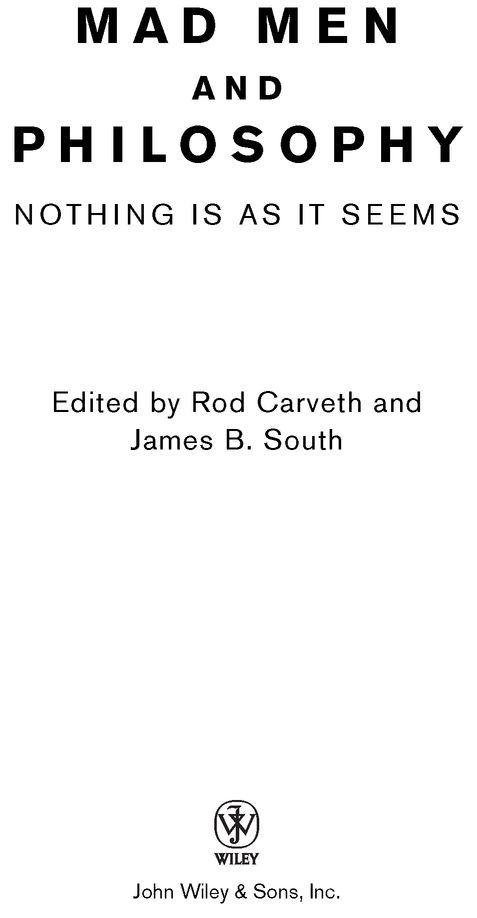Table of Contents
The Blackwell Philosophy and Pop Culture Series
Series Editor: William Irwin
South Park and Philosophy
Edited by Robert Arp
Metallica and Philosophy
Edited by William Irwin
Family Guy and Philosophy
Edited by J. Jeremy Wisnewski
The Daily Show and Philosophy
Edited by Jason Holt
Lost and Philosophy
Edited by Sharon Kaye
24 and Philosophy
Edited by Richard Davis, Jennifer
Hart Weed, and Ronald Weed
Battlestar Galactica and
Philosophy
Edited by Jason T. Eberl
The Office and Philosophy
Edited by J. Jeremy Wisnewski
Batman and Philosophy
Edited by Mark D. White and
Robert Arp
House and Philosophy
Edited by Henry Jacoby
Watchmen and Philosophy
Edited by Mark D. White
X-Men and Philosophy
Edited by Rebecca Housel and
J. Jeremy Wisnewski
Terminator and Philosophy
Edited by Richard Brown and
Kevin Decker
Heroes and Philosophy
Edited by David Kyle Johnson
Twilight and Philosophy
Edited by Rebecca Housel and
J. Jeremy Wisnewski
Final Fantasy and Philosophy
Edited by Jason P. Blahuta and
Michel S. Beaulieu
Alice in Wonderland and
Philosophy
Edited by Richard B. Davis
Iron Men and Philosophy
Edited by Mark D. White
True Blood and Philosophy
Edited by George A. Dunn and
Rebecca Housel
Copyright 2010 by John Wiley & Sons. All rights reserved
Published by John Wiley & Sons, Inc., Hoboken, New Jersey
Published simultaneously in Canada
No part of this publication may be reproduced, stored in a retrieval system, or transmitted in any form or by any means, electronic, mechanical, photocopying, recording, scanning, or otherwise, except as permitted under Section 107 or 108 of the 1976 United States Copyright Act, without either the prior written permission of the Publisher, or authorization through payment of the appropriate per-copy fee to the Copyright Clearance Center, 222 Rosewood Drive, Danvers, MA 01923, (978) 750-8400, fax (978) 646-8600, or on the web at www.copyright.com. Requests to the Publisher for permission should be addressed to the Permissions Department, John Wiley & Sons, Inc., 111 River Street, Hoboken, NJ 07030, (201) 748-6011, fax (201) 748-6008, or online at http://www.wiley.com/go/permissions.
Limit of Liability/Disclaimer of Warranty: While the publisher and the author have used their best efforts in preparing this book, they make no representations or warranties with respect to the accuracy or completeness of the contents of this book and specifically disclaim any implied warranties of merchantability or fitness for a particular purpose. No warranty may be created or extended by sales representatives or written sales materials. The advice and strategies contained herein may not be suitable for your situation. You should consult with a professional where appropriate. Neither the publisher nor the author shall be liable for any loss of profit or any other commercial damages, including but not limited to special, incidental, consequential, or other damages.
For general information about our other products and services, please contact our Customer Care Department within the United States at (800) 762-2974, outside the United States at (317) 572-3993 or fax (317) 572-4002.
Wiley also publishes its books in a variety of electronic formats. Some content that appears in print may not be available in electronic books. For more information about Wiley products, visit our web site at www.wiley.com.
Library of Congress Cataloging-in-Publication Data:
Mad men and philosophy : nothing is as it seems / edited by Rod Carveth and James B. South.
p. cm.(The Blackwell philosophy and pop culture series)
Includes index.
ISBN 978-0-470-60301-7 (pbk.)
1. Mad men (Television program) I. Carveth, Rod. II. South, James B.
PN1992.77.M226M33 2010
791.4572dc22 2010005158
ACKNOWLEDGMENTS
I Think We Need to Salute That!
The work on this book required getting into character. Much whiskey, many martinis, and countless cigarettes were consumed in an effort to make the book an authentic companion to Mad Men. In the interest of research, liaisons were entered into, suits were worn, and hostile takeovers by other publishers were thwarted.
Putting together a volume such as Mad Men and Philosophy requires a team of people working togethera team that deserves to be saluted for their efforts. We would like to thank our contributing authors, who met every tight deadline with high-quality work and good cheer. Unlike Bert Cooper, Bill Irwin, the Blackwell Philosophy and Pop Culture Series editor, offered invaluable assistance every step of the way, and Constance Santisteban at Wiley saw this book through press with all the efficiency and oversight of Joan Holloway.
Rod thanks James for such a great working relationship. Anytime James wants to collaborate on another project, Rod is game.
Rod has two other people he would also like to thank. First, Alana Carveth deserves a lot of credit for putting up with a father who was more distracted and forgetful than usual. Its not easy to raise a parent at seventeen, but Alana really rose to the occasion. Second, Rod would like to thank Nina Spiller. Nina came into his life just as the book project was taking off. A fellow Mad Men fan, Nina provided love, support, and encouragement that made editing this volume much, much easier. Rod feels truly blessed to have two such wonderful women in his life.
James would like to thank Beth OSullivan and Lula Hopkins, the Allison and Hildy in his life, for putting up with his taking on a new project with the time commitments that entailed. He knows it made their jobs just a bit harder. Working with someone youve never met in person can be tricky. Rod made it very easy, and James enjoyed the collaborative effort.
Last but not least, we want to thank you, the reader, for your interest in the show and in this book. And we want to assure you that no one lost a foot throughout the entire process.
INTRODUCTION
A Thing Like That
Take off your shoes. Shut the door. Have a seat. Kick back in your Eames chair. Admire that Rothko print. Pour your favorite drink. And prepare to enter the philosophical world of Mad Men, or at least the world of philosophers thinking and writing about Mad Men.
Mad Men premiered in July 2007 to immediate critical acclaim. Set in 1960, the series seemed both exotic and nostalgic. It showed a past that many of us had not lived through, and for those who had lived through it, the episodes shined a new light on old experiences. Over the course of the first three seasons, Mad Men reminded us of many uncomfortable truths, from the prevalence of drinking and smoking to the systemic sexism, racism, and homophobia that were ever-present in the early 1960s. It also reminded us of a glamour long since lost as we became reacquainted with the fashions of the era, the luxurious civility of airline flight, and the forgotten manners and mores of a previous generation. And








